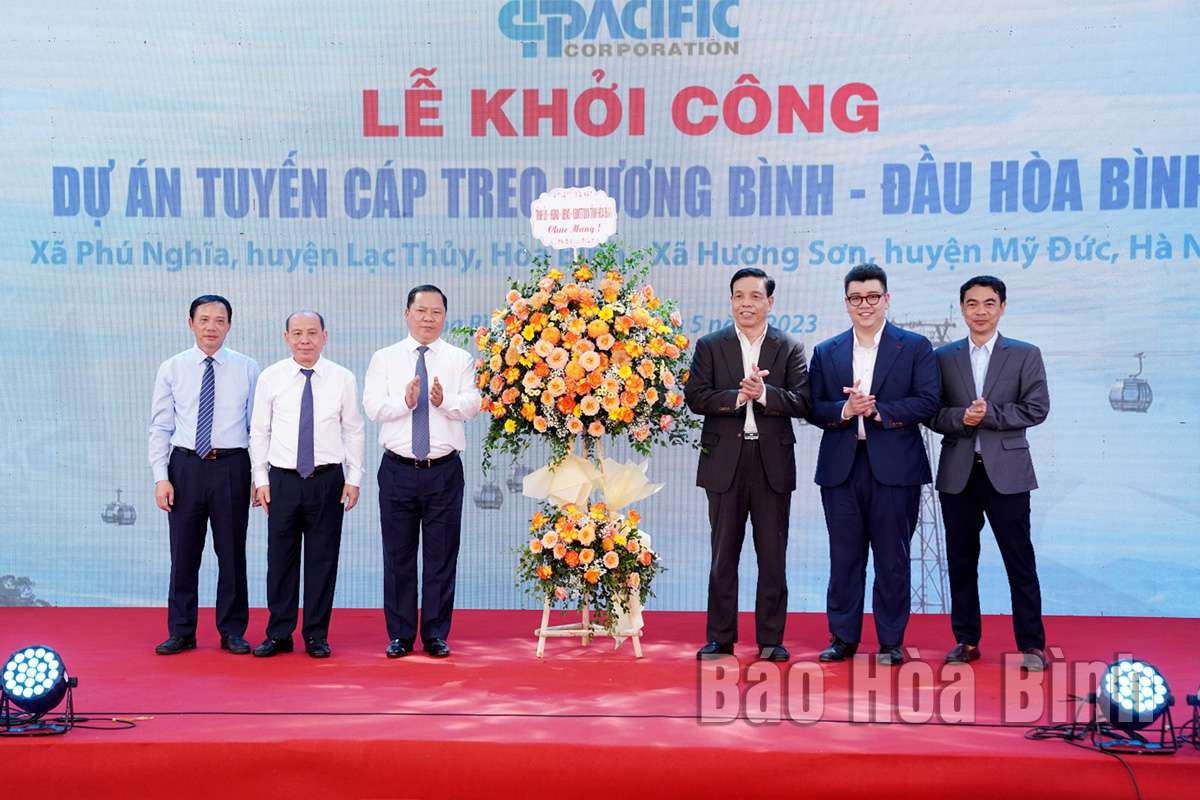
(HBO) – The Thai Binh Tourism Co. Ltd, an affiliate of Pacific Group, held a ceremony in Phu Nghia commune, Lac Thuy district, Hoa Binh province, to start the construction of works in Hoa Binh section of the Huong Binh cable line project.

Nguyen Phi Long, Secretary of the provincial Party Committee; Bui Duc Hinh, Standing Vice Secretary of the provincial Party Committee and Chairman of the provincial People's Council; and Bui Van Khanh, Vice Secretary of the provincial Party Committee and Chairman of the provincial People's Committee, present flowers to the investor.
Invested by the Thai Binh Tourism Co. Ltd, the project covers an area of about 35 ha, with a total investment of some 1.7 trillion VND (73.9 million USD), including a nearly 3km cable car line, two terminals, a customer service area, a pier, a restaurant, and a villa resort, among others.
It has been so far the most advanced transportation system imported from Austria. The project connects Huong Pagoda in Huong Son commune, My Duc district, Hanoi, with the Tien Pagoda in Phu Nghia commune, Lac Thuy district, reducing travel time between the two sites from 60 minutes by road to just 10 minutes, serving 1,500 - 2,000 passengers per hour, equivalent to 12,000 - 16,000 passengers per day.
The Huong Binh cable line is located in the low-lying area of the spiritual region encompassing Huong Pagoda (a special national cultural heritage site), Tien Pagoda (a national cultural heritage site), and the Tam Chuc pagoda complex (a national cultural heritage site). Scheduled to be operational in the fourth quarter of 2024, the project is expected to enhance transportation connectivity and enable tourists to explore the unique natural landscapes, contributing to the development of tourism, culture, and commerce and services in Hanoi, Hoa Binh, Ha Nam, and adjacent areas.
Speaking at the groundbreaking ceremony, Vice Secretary of the provincial Party Committee and Chairman of the provincial People’s Committee Bui Van Khanh described Huong Binh cable line as a key project of the province. He asked the investor and construction units to continue ensuring the quality and effectiveness of the project, contributing to the local socio-economic development.
The Lac Thuy district’s Party Committee and authorities were assigned to regularly work with the investor to address any arising difficulties, thus ensuring that the project will meet schedule./.
According to data from the Hoa Binh Provincial Party Committee, the industrial production index for the first six months of 2025 is estimated to have increased by 20% compared to the same period last year. This marks the highest year-on-year growth rate for this period since 2020.
In the first six months of 2025, Hoa Binh province’s export turnover was estimated at 1.145 billion USD, marking an 18.11% increase compared to the same period in 2024. Import turnover was estimated at $ 804 million, a 17.15% increase, which helped the province maintain a positive trade balance.
The lives of the ethnic minority farmers in Tan Lac district have gradually improved thanks to the new directions in agricultural production. This is a testament to the collective strength fostered through the professional associations and groups implemented by various levels of the district’s Farmers’ Union.
With the motto the "product quality comes first,” after nearly one year of establishment and operation, Muong village’s Clean Food Agricultural and Commercial Cooperative, located in Cau Hamlet, Hung Son Commune (Kim Boi district), has launched reputable, high-quality agricultural products to the market that are well-received by consumers. The products such as Muong village’s pork sausage, salt-cured chicken, and salt-cured pork hocks have gradually carved out a place in the market and they are on the path to obtaining the OCOP certification.
In the past, the phrase "bumper harvest, rock-bottom prices" was a familiar refrain for Vietnamese farmers engaged in fragmented, small-scale agriculture. But today, a new spirit is emerging across rural areas of Hoa Binh province - one of collaboration, organisation, and collective economic models that provide a stable foundation for production.
Maintaining growing area codes and packing facility codes in accordance with regulations is a mandatory requirement for agricultural products to be eligible for export. Recently, the Department of Agriculture and Environment of Hoa Binh province has intensified technical supervision of designated farming areas and packing facilities to safeguard the "green passport" that enables its products to access international markets.



